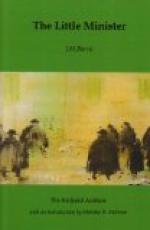Boys play at casting a humming-top into the midst of others on the ground, and if well aimed it scatters them prettily. I seemed to be playing such a game with my thoughts, for each new one sent the others here and there, and so what could I do in the end but fling my tops aside, and return to the heeling of my boot?
I was thus engaged when the sudden waking of the glen into life took me to my window. There is seldom silence up here, for if the wind be not sweeping the heather, the Quharity, that I may not have heard for days, seems to have crept nearer to the school-house in the night, and if both wind and water be out of earshot, there is the crack of a gun, or Waster Lunny’s shepherd is on a stone near at hand whistling, or a lamb is scrambling through a fence, and kicking foolishly with its hind legs. These sounds I am unaware of until they stop, when I look up. Such a stillness was broken now by music.
From my window I saw a string of people walking rapidly down the glen, and Waster Lunny crossing his potato-field to meet them. Remembering that, though I was in my stocking soles, the ground was dry, I hastened to join the farmer, for I like to miss nothing. I saw a curious sight. In front of the little procession coming down the glen road, and so much more impressive than his satellites that they may be put of mind as merely ploughman and the like following a show, was a Highlander that I knew to be Lauchlan Campbell, one of the pipers engaged to lend music to the earl’s marriage. He had the name of a thrawn man when sober, but pretty at the pipes at both times, and he came marching down the glen blowing gloriously, as if he had the clan of Campbell at his heels. I know no man who is so capable on occasion of looking like twenty as a Highland piper, and never have I seen a face in such a blaze of passion as was Lauchlan Campbell’s that day. His following were keeping out of his reach, jumping back every time he turned round to shake his fist in the direction of the Spittal. While this magnificent man was yet some yards from us, I saw Waster Lunny, who had been in the middle of the road to ask questions, fall back in fear, and not being a fighting man myself, I jumped the dyke. Lauchlan gave me a look that sent me farther into the field, and strutted past, shrieking defiance through his pipes, until I lost him and his followers in a bend of the road.
“That’s a terrifying spectacle,” I heard Waster Lunny say when the music had become but a distant squeal. “You’re bonny at louping dykes, dominie, when there is a wild bull in front o’ you. Na, I canna tell what has happened, but at the least Lauchlan maun hae dirked the earl. Thae loons cried out to me as they gaed by that he has been blawing awa’ at that tune till he canna halt. What a wind’s in the crittur! I’m thinking there’s a hell in ilka Highlandman.”
“Take care then, Waster Lunny, that you dinna licht it,” said an angry voice that made us jump, though it was only Duncan, the farmer’s shepherd, who spoke.




